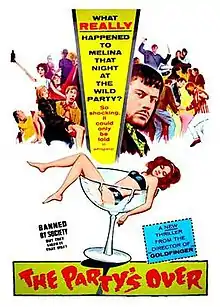The Party's Over (1965 film)
The Party's Over is a 1965 British drama film directed by Guy Hamilton and starring Oliver Reed. Filmed in 1963, it was censored in the UK over scenes of implied necrophilia, which delayed its release until 1965. It was produced by Anthony Perry, with music by John Barry. Guy Hamilton asked for his name to be removed from the credits in protest at the censorship of the film.[1]
| The Party's Over | |
|---|---|
 Theatrical release poster | |
| Directed by | Guy Hamilton |
| Written by | Marc Behm |
| Produced by | Anthony Perry |
| Starring | Oliver Reed Clifford David Ann Lynn Katherine Woodville |
| Cinematography | Larry Pizer |
| Edited by | John Bloom |
| Music by | John Barry |
| Distributed by | Monarch Film Corporation (UK) Allied Artists Pictures (US) |
Release date |
|
Running time | 94 minutes |
| Country | United Kingdom |
| Language | English |
Plot
A troubled young American woman, Melina, visits London and encounters a group of beatniks in Chelsea who live lives very different from her own. One of the beatnik group, the devil-may-care Moise (pronounced like Louise), is determined to seduce her, but she resists. The group believe in free love and spend their time smoking and listening to jazz in windowless rooms.
Uncertain what she wants in life, she has been avoiding transatlantic phone calls from her fiancé, Carson, who is eventually sent to London by her wealthy father to bring her back for her wedding.
The beatniks use diversionary tactics to misdirect Carson, and Melina continues to evade him, although he comes close to finding her several times.
The beatniks hang around in an old theatre. One (Phil) gets depressed and goes to the rooftop. The group variously taunt him or shout at him from the ground and he falls forward to his death. His suicide is blamed on failing his university exams but the group know differently. The suicide is then explained: Milena has passed out at a party and the crowd decide to bury her as a joke. They dig a grave on a building site, but when they go back for "the body" Milena has disappeared (but Phil is still there).
Meanwhile one of the female beatniks, Nina is spending a lot of time with Carson and he falls in love with her.
Milena's father arrives to help Carson search, but it appears that Milena really is dead at the point where they sign for "the clothes of the deceased" at a morgue. Nina admits she has known this all along.
When Carson finally confronts Moise it is revealed that Milena truly was dead, having fallen off the balcony, but the party-goers simply presume she has passed out. Only Phil (who kisses her o the ground) realises she is dead. The mock funeral is therefore accidentally real.
It eventually appears that Moise loved Milena, and Carson loves Nina more than Milena.
At the end, a coffin (presumably holding Milena) is placed on a train to Southampton by Carson and her father. Moise appears and threatens Carson that he will tell her father the truth. Ultimately all he says is "I'm sorry".
There is no explanation as to why the cause of death was not established at the morgue.
Carson leaves arm in arm with Nina.
Cast
- Oliver Reed as Moise
- Clifford David as Carson
- Ann Lynn as Libby
- Katherine Woodville as Nina
- Louise Sorel as Melina
- Mike Pratt as Geronimo the drummer
- Maurice Browning as Tutzi
- Jonathan Burn as Phillip
- Roddy Maude-Roxby as Hector
- Annette Robertson as Fran
- Alison Seebohm as Ada
- Barbara Lott as Almoner
- Eddie Albert as Milena's father, Ben
Release
Censorship
The film was submitted to the British Board of Film Classification (BBFC) in March 1963. John Trevelyan, the Secretary of the Board of the BBFC, called the film "unpleasant, tasteless and rather offensive". The BBFC requested three rounds of cuts, before granting an X certificate and allowing the film to finally reach cinemas in the UK in 1965. Two big changes were incorporated: a voice-over by Oliver Reed and a happier ending focusing on Nina and Carson.
Director Guy Hamilton, the producer, and the executive producer all had their names removed from the credits in protest.[2]
Reception
In a positive retrospective review for The Guardian, Philipp French found the film of "considerable historic interest."[3]
References
- "The Party's over (1965)". Archived from the original on 14 July 2014. Retrieved 1 July 2014. The Party's Over 1965
- "Unsung Films: The Party's Over (1965)". Archived from the original on 14 July 2014. Retrieved 1 July 2014.
- French, Philip (22 May 2010). "The Party's Over". The Guardian. ISSN 0261-3077. Retrieved 8 May 2023.
- 05/31/2010 in 1960s, Blu-ray, Teen rebellion (31 May 2010). "DVD and Blu-ray review: The Party's Over (1963)". Cinedelica. Retrieved 30 March 2012.
{{cite web}}: CS1 maint: multiple names: authors list (link)